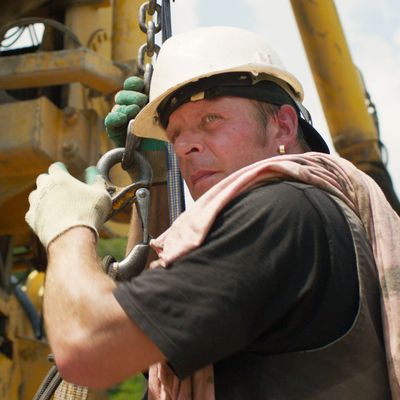
Part of the engrossing appeal of Maren Ade’s transcendentally funny Toni Erdmann was its attention to a kind of mundane side of Europe rarely seen in film. The Romania that Ines (Sandra Hüller) has relocated to for her miserable consulting job is a world of contracts and environmental and economic indifference, anonymous hotel spas and bars. Ade harnessed that drabness for comedy; now as a producer she’s pursued a more elegiac angle with Valeska Grisebach’s Western. A culture clash defined by an incredibly strong first-time performance, it’s continually more emotionally surprising than its dry packaging lets on.
Grisebach follows a team of German contractors who have traveled to rural Bulgaria to build a hydroelectric plant, and the residents of a nearby village who are affected by it. Between the two groups is Meinhard (Meinhard Neumann), a newcomer to the German team who wanders into the sleepy, nearly deserted town and begins to form a bond with the locals, transcending language and cultural barriers. His friendships become a diplomatic asset during tense negotiations with the townspeople, but also makes him an object of suspicion for his xenophobic co-workers. Perhaps less suspiciously, the audience is made to wonder: What is Meinhard looking for? What does he think he’ll find in this tiny Bulgarian village that seems to hold so much more promise for him than a life on the road driving a bulldozer?
The film’s title draws attention to a structure straight from the Hollywood back lots of the ’50s, a tale of lonely men and wilderness and tiny towns on the precipice of all-out chaos. Once one starts trying to apply Western tropes onto this plot, plenty of fascinating questions follow: Who are the settlers? Who are the “savages”? No answer is clear-cut. But the title also highlights a telling inversion: While the American Western mythologizes the early, often lawless beginnings of white settlers’ society-building in the American West, Western documents a decline of sorts. “We’re back! It only took us 70 years,” jokes one of the Germans on the drive to the build site, somewhat horrifyingly alluding to the occupation of Bulgaria by the Nazis in WWII. The villagers old enough to remember it recall the Germans’ orderliness and efficiency; the team of contractors — haggard, balding, potbellied — offer a stark contrast. They may not be Nazis, but that doesn’t make them any more trustworthy.
Grisebach has a subtle and empathetic way with her cast of nonprofessional actors, particularly the still waters of leading man Neumann. With his sinewy frame, bushy mustache and eyes that seem to hold endless reserves of sorrow, he’s one of the more compelling figures I’ve seen onscreen recently, more voluntarily vulnerable than the searchers of Westerns past. She’s attentive to the competitive machismo among the workers, but also the instinctive, violent threat they pose to the women of the village, even from across a river. Western is an incredibly strong snapshot of an awkward, uncertain phase in a corner of civilization, only undone by its shrug of an ending. But it’s worth it for quiet grace of Neumann alone, and the question of what both Meinhards will do after the screen goes black.

